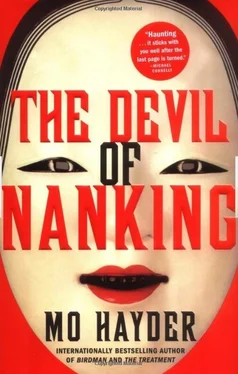‘There are those who say Tang is weak, not committed. What do you think of those opinions? Some people say the Japanese will walk all over him. Some people say they’ll come into the city and kill us in our homes.’
‘Pah! Some people are too afraid of change, if you ask me. It takes men like us, like you and me, Master Shi, to stand firm. To forget the cowardly, backward nation we have left behind us – to show faith in our city, in our president’s choice of general. Otherwise what do we amount to? A gaggle of whey-faced cowards, that’s what. Besides, the Nationalist forces have every trick up their sleeves. Just look out there, beyond the eastern walls. Can you see the smoke?’
‘Yes.’
‘Buildings burning outside the eastern walls. Burned by our men. To those who say Chiang Kai-shek has no military policy, give them this: scorched earth. The policy of scorched earth. Let the Japanese find nothing, nothing to subsist on as they march. That’ll finish them in no time.’
The relief I felt was indescribable. Suddenly, after all this anxiety, I am vindicated, reassured that I am not alone. Standing there, all at once it seemed as if I was with a very dear old friend. We talked and talked, the snow falling on our shoulders, and when, in the course of our conversation, we discovered that he and his family are living, coincidentally, less than half a li away from Shujin and myself, we decided to continue the conversation at his house. We walked amicably, arm in arm, back to his house, a one-storey adobe shack with a kaoling thatch, no courtyard and no electricity, in which live old Liu, his wife and their teenage son, a dark little thing who appears to my eyes to have been rubbed in dirt.
Liu has brought many things from Shanghai, foreign luxuries: cans of condensed milk and French cigarettes, which we smoked while we talked, like a pair of fashionable Parisian intellectuals. Earlier this summer, it transpires, old Liu locked up his house near Shanghai’s Bund and sent his wife and son ahead of him, here, to Nanking, while he stayed on at the university, sleeping in a lecture hall and holding out in his job for as long as was possible. When eventually the city was overrun he evaded capture by hiding in a waste barrel in the university kitchen, and had reached Nanking with a great tide of peasants, just ahead of the Japanese Army, everywhere seeing flatboats and sampans crammed with evacuees cowering under the reeds.
‘When I got to Suzhou I saw the Japanese soldiers first hand. I saw them jumping across the canals. Leaping across the water like demons, arisakas jangling on their backs. They are so nimble nothing can stop them. The riben guizi.’
Hearing this I felt a vague unease. Here, in the privacy of his house, Liu Runde seemed less brave and zealous than he had out on the street – from time to time he would rub his nose or glance nervously in the direction of the windows. It crossed my mind then that in spite of his big words he might be as anxious as I was.
‘Do you know,’ he said, raising his eyebrows and leaning in to me, giving me a dry smile, ‘I even saw Shanghai, the whole city of Shanghai, floating inland across the plains?’
‘Shanghai? How can that be?’
‘Yes. You think I’m crazy. Or dreaming. But it’s true. I stood on an escarpment and saw Shanghai drifting inland.’
I frowned. ‘I don’t understand.’
He laughed. ‘Yes! That look! That is exactly the same look I had on my face when I saw it. It took some time for me to believe I wasn’t going mad. Do you know what I was really seeing?’
‘No.’
‘I was seeing the panic of the Shanghai residents. They’ve dismantled whole buildings. Whole factories. Can you imagine it? They’re moving them inland on junks and steamers, south-west to Chongqing. I saw turbines floating down the Yangtze, an entire plant, a textile mill…’ He held out his hand and mimicked the gay bobbing motion of a boat on a horizon. ‘All of Shanghai sailing upstream to Chongqing.’
He smiled at me, encouraging a response, but I was silent. Something here was wrong. Earlier Liu’s wife had placed a pie of grated chestnut on the table. It was decorated with the character for good luck in egg white, and now my eye was drawn to that familiar character. I raised my eyes to the corridor, to where she had retired, then dropped them back to the pie. I considered her earlier demeanour – oddly withdrawn – and suddenly the picture became clear.
Of course. Of course. I saw it now. I looked up at Old Liu, with his pinched face and greying hair, and understood. He was fighting the same battle with his wife as I was with Shujin. There is no doubt he fears the Japanese, but he fears years of superstition and backward beliefs more. We are in the same bed, Liu and I, and, unlike the old saying, we are dreaming exactly the same dream.
‘Old Liu.’ I leaned a little closer, and spoke in a low whisper: ‘Forgive me.’ I swallowed and tapped my fingers on the table. This was an awkward thing to say. ‘Forgive me if I haven’t understood you. I believe that earlier you said there was nothing to fear from the Japanese.’
At that Liu’s face changed. He became very red and he rubbed his nose compulsively, as if he was trying not to sneeze. He straightened in his chair and cast a glance in the direction his wife had retreated. ‘Yes, yes,’ he said bluffly. ‘Yes, that is exactly what I said.’ He held up a reproving finger. ‘We must be at pains to remember this: those who doubt the Kuomintang will always look to us, searching for faith in our eyes. Keep the faith, Master Shi, keep the faith. We are doing the right thing.’
As I walked home through the snow, I tried to keep my head high. Keep the faith. We are doing the right thing. But I was remembering something else about our meeting that had made me uneasy. As we were talking in the market I had noticed that the women of Nanking were hiding. I was watching them during the conversation, glancing over the professor’s shoulder, and I had quite forgotten about it until now. They had come to the market as usual, but they all wore shawls over their heads and their faces were blackened with charcoal. They walked almost bent double like old crones, although I knew many of them were young.
I felt suddenly angry. I knew what they are afraid of at the hands of the Japanese. I knew they were hiding, turning inwards like hibernating animals, disappearing inside themselves. But must this happen? Must the colour in our country change? We, the Chinese, a whole people, a whole cowardly, backward nation, we are disappearing into our landscape. Running and hiding. Chameleonizing ourselves into a million outlines scratched into the dry rock and stone of the Gobi desert. We’d rather disappear and sink into our land than stand up straight and look the Japanese in the eye.
Jason said the house had belonged to the landlord’s mother, that she had become very ill, maybe crazy, and the lower levels had fallen into such disrepair that they had become uninhabitable. Clouds of mosquitoes always hung around the closed-up windows and Svetlana said there were ghosts down there. She told us that the Japanese believed in a strange creature: a winged goblin, a feathered mountain man – Tengu, they called him – an abductor of human beings, who could flit as easily as a moth. Svetlana swore she’d heard a rustling in the garden and seen something heavy picking its way through the persimmon trees. ‘Sssh!’ she’d say, breaking off dramatically in the middle of a story, her finger to her lips. ‘Did you hear that? From downstairs?’
Jason laughed at her, Irina was condescending. I said nothing. On the subject of ghosts I wasn’t going to commit. I loved the house and its quirks – I soon got used to the peeling walls, the musty, closed-off rooms, the rows of disused kotatsu electric heaters in the store rooms – but there were times in my room, so close to the barricaded wing, that I felt like the last line of defence. Defence against what I didn’t know. The rats? The emptiness? I wasn’t sure. I’d lived alone for so long now that I should have been accustomed to great empty spaces pressing against my bedroom walls at night, but there were times in Takadanobaba that I’d wake in the night, rigid with fear, convinced that someone had just walked past the bedroom door.
Читать дальше












